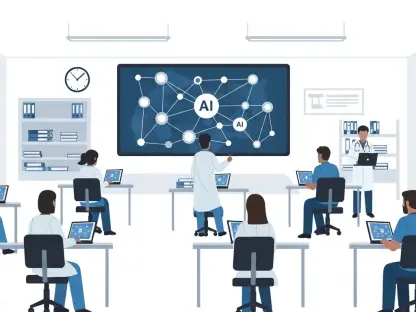The Evolving Landscape of AI in Medical Imaging
The integration of artificial intelligence in medical imaging has reached a pivotal moment, with over 70% of healthcare providers globally adopting some form of AI to enhance diagnostic precision, according to recent industry surveys. This transformative technology is no longer a distant prospect but a critical tool reshaping how clinicians approach complex conditions like breast cancer. The ability of AI to analyze vast datasets swiftly offers a glimpse into a future where early detection and personalized care become the norm, addressing long-standing challenges in healthcare delivery.
A significant focus lies in key segments such as breast cancer screening, ultrasound diagnostics, and remote care solutions, where major players like GE HealthCare and DeepHealth are driving progress. These companies are at the forefront, leveraging AI to improve accuracy in mammography and streamline workflows in ultrasound imaging. Their efforts are complemented by a growing ecosystem of innovators pushing the boundaries of what medical imaging can achieve, particularly in underserved regions where access to advanced diagnostics remains limited.
Technological advancements, including machine learning algorithms and cloud-based platforms, are fueling this evolution, enabling faster processing and more reliable outcomes. Partnerships between industry leaders are proving essential in tackling systemic issues like clinician burnout and geographic disparities. By combining expertise and resources, such collaborations are setting new standards for efficiency and accessibility, ensuring that AI’s potential is harnessed to meet pressing healthcare needs worldwide.
Innovations Through GE HealthCare and DeepHealth Partnership
Cutting-Edge AI Solutions for Breast Cancer Screening
The collaboration between GE HealthCare and DeepHealth has yielded notable success in enhancing breast cancer screening through the integration of AI-powered workflows. Initially, DeepHealth’s innovative algorithms were paired with GE HealthCare’s Senographe Pristina mammography system, resulting in improved detection rates and reduced false positives. This synergy has allowed radiologists to identify potential issues with greater confidence, streamlining the diagnostic process for patients.
Building on this foundation, the partnership has expanded its mission to ensure global access to advanced breast cancer solutions. By incorporating AI-driven tools, the focus now includes intelligent clinical support that aids in identifying subtle abnormalities often missed by the human eye. This initiative aims to democratize high-quality care, particularly in regions where specialized expertise is scarce, making a tangible difference in early intervention.
The emphasis on scalability means that these AI enhancements are designed to adapt to diverse healthcare settings, from urban hospitals to rural clinics. This adaptability is crucial for addressing the varying needs of patient populations worldwide. As a result, the collaboration is not just improving technology but also redefining how breast cancer care is delivered on a broader scale.
Impact on Ultrasound Imaging and Remote Care
In ultrasound imaging, the partnership has introduced DeepHealth’s Thyroid Suite into GE HealthCare’s portfolio, marking a significant step forward in automation. This suite focuses on nodule detection, characterization, and standardized reporting, reducing the manual burden on clinicians. Such advancements are critical in a field where precision and speed can directly impact patient outcomes.
Data from early implementations highlight the effectiveness of these tools, with reports indicating a 30% reduction in exam time due to optimized workflows. Additionally, over 94% of radiologists have accepted AI-generated reports, reflecting high trust in the system’s accuracy. These metrics underscore how automation can alleviate pressure on healthcare professionals while maintaining diagnostic reliability.
Beyond ultrasound, DeepHealth’s TechLive remote scanning solution, integrated with GE HealthCare’s products, is transforming access to expert care. This technology enables real-time guidance for sonographers across multiple locations from a centralized hub, effectively bridging staffing gaps and geographic barriers. By ensuring consistent quality in imaging regardless of location, this innovation is paving the way for equitable healthcare delivery.
Challenges in Implementing AI-Driven Healthcare Solutions
Adopting AI in medical imaging is not without hurdles, as technological complexities often pose significant barriers. Integrating sophisticated algorithms into existing systems requires substantial investment in infrastructure and compatibility upgrades. Many healthcare facilities, especially smaller ones, struggle to justify these costs against tight budgets, slowing the pace of adoption.
Further complicating the landscape are clinician training needs and geographic disparities in healthcare access. Teaching medical staff to use AI tools effectively demands time and resources, while rural and remote areas often lack the personnel to implement such technologies. Staffing shortages exacerbate these issues, leaving many communities without the benefits of cutting-edge diagnostics.
To address these obstacles, scalable technology and strategic partnerships offer promising solutions. Developing modular AI systems that can be tailored to different environments could ease integration challenges. Collaborative efforts between tech providers and healthcare organizations may also help distribute costs and expertise, ensuring that advancements reach beyond well-funded urban centers to those in greatest need.
Regulatory and Compliance Considerations in AI Healthcare
Navigating the regulatory landscape is a critical aspect of deploying AI in medical imaging, as stringent data privacy and security standards must be met. Governing bodies worldwide enforce rules to protect patient information, requiring companies to implement robust safeguards against breaches. Compliance with these regulations is non-negotiable to maintain operational integrity and public confidence.
Ensuring patient safety and trust in AI-driven diagnostics hinges on adherence to these frameworks. Any misstep in handling sensitive data or delivering accurate results can undermine credibility and expose organizations to legal risks. Thus, developers must prioritize transparency and accountability in how AI tools are designed and used within clinical settings.
For GE HealthCare and DeepHealth, regulatory considerations shape every stage of innovation, from development to deployment. Aligning with global standards not only facilitates market entry but also reassures stakeholders of the technology’s reliability. This alignment is essential for scaling solutions across borders, ensuring that advancements are both effective and ethically sound.
Future Prospects of AI in Medical Imaging and Patient Care
Looking ahead, AI in healthcare is poised to evolve with emerging trends like remote connectivity and personalized diagnostics gaining traction. Remote systems are expected to further bridge access gaps, allowing specialists to support patients and clinicians from afar. Meanwhile, tailored diagnostic approaches promise to enhance treatment by factoring in individual patient profiles.
Potential disruptors, such as shifting consumer expectations and global health challenges, could influence the trajectory of this field. Patients increasingly demand faster, more transparent care, pushing providers to innovate continuously. Simultaneously, unforeseen crises may redirect resources or highlight new priorities, necessitating agile responses from industry leaders.
Innovation and collaboration remain central to driving growth, as exemplified by the shared vision of GE HealthCare and DeepHealth. Their commitment to improving patient outcomes through technology positions them as frontrunners in shaping a more connected and responsive healthcare system. Sustained focus on these principles will likely determine the extent to which AI can transform medical imaging in the coming years.
Conclusion: Transforming Healthcare Through Strategic Collaboration
Reflecting on the strides made through the partnership between GE HealthCare and DeepHealth, it becomes evident that their joint efforts have significantly advanced medical imaging and breast cancer care. Their integration of AI into mammography and ultrasound systems marks a turning point, enhancing diagnostic precision and clinician efficiency across diverse settings. This collaboration stands as a testament to the power of strategic alliances in overcoming complex healthcare challenges.
Looking back, the impact of streamlined workflows and remote care solutions is profound, as they address critical issues like staffing shortages and geographic barriers. To build on this momentum, stakeholders are encouraged to prioritize investment in scalable AI technologies that can adapt to varied environments. Fostering continuous training programs for clinicians also emerges as a vital step to ensure seamless adoption.
As a final consideration, expanding public-private partnerships offers a pathway to distribute resources more equitably, ensuring that innovations reach underserved populations. Advocating for flexible regulatory frameworks that balance safety with innovation is another crucial action. These steps, taken collectively, promise to sustain the progress achieved and further revolutionize global access to quality healthcare.









